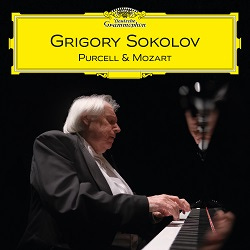Grigory Sokolov - Purcell & Mozart
(Deutsche Grammophon, 2024)
Classical concert pianism benefits from the dramatic. The first step in that direction is the personality; the more iconoclastic, the better. Grigory Sokolov comes from an impressive line of Russian pianists who were both technically accomplished and mercurial: Artur Rubinstein, Vladimir Horowitz, and Emil Gilels. Sokolov proved to be a late bloomer having won the 1966 International Tchaikovsky Piano Competition (following another Russian, Vladimir Ashkenazi, who won in 1962) and not becomeing very wel known until 20 years later. Since that time, the pianist has taken on a cult status, where audiences show up early in spite of Sokolov’s practice of not revealing his program until the very last moment.
Purcell & Mozart find the pianist straddling the seventeeth and eighteenth centuries with a program collected from two performances given at the Quincena Musical festival16 August 2023 (Mozart) and the Santander International Festival two days later (Purcell). The Purcell section is devoted to that composers Suites for Harpsichord Nos. 2, 4, and 7, as well as several minitures for harpsichord. Sokolov’s articulation is studied and confident as he translates earlier work intend for earlier instruments to the expansive modern piano. The choice of Purcell as subject is inspired if for no other reason than it was not his inheritors Bach or even Handel.
Sokolov is a meat and potatoes performer, playing with an assured confidence that is spare and genuine. There is none of the theatrics of Horowitz nor bottom banging of Gilels. He gives the listeners just the facts. For the Mozart section of the pianist chose the Piano Sonata No. 13 in B-flat Major. Sokolav’s measured playing exposed the skeleton of the piece with enough space in which to walk around. Five encores followed including pieces by Rameau, Chopin (a Prelude and Mazurka) ending with Bach’s Prelude in E minor, BWV 255, arranged by Siloti for modern piano played convincingly with a pungent grace and insight.



